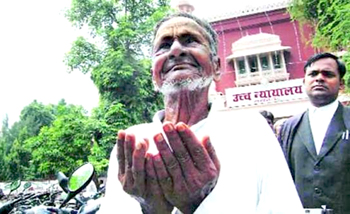Ayodhya, Jul 20: The oldest litigant in the Ram Janmabhoomi-Babri mosque dispute, Mohammad Hashim Ansari died here today due to heart-related ailments.
Ansari, 95, took his last breath at his residence in the wee hours, according to his son Iqbal.
Ansari had been associated with the Babri mosque dispute case since December 1949.
In 1961, he along with six others became main plaintiff in the 'Ayodhya title suit' filed by the Sunni Central Waqf Board in the court of Faizabad civil judge.
Five other plaintiffs were Mohammad Farooq, Shahabuddin, Maulana Nisaar, Mahmood Sahab and Hashim Ansari.
He was first to file the suit in the court of civil judge of Faizabad on the matter.
Allahabad High Court in 2010 in its majority verdict allotted one-third of the disputed site in Ayodhya to Nirmohi Akahara. The other two-thirds portion has been given equally to be shared by the Waqf Board and the side representing Ram Lalla.
Soon after the verdict, Ansari had called for burying the dispute and making "a fresh start".







Comments
72 milenga Kya ?
Inna lillahi wa inna ilaihi Rajivoon..... The man who fought for the justice as per the constitution of India.......
Add new comment